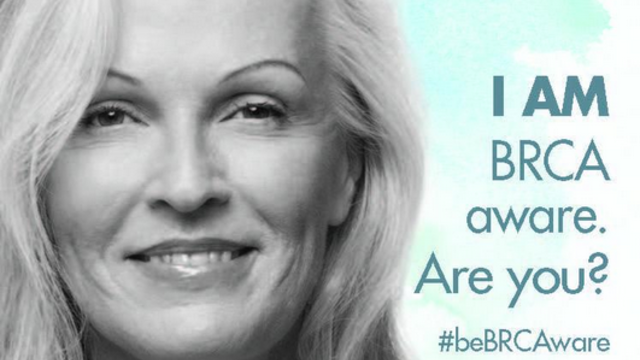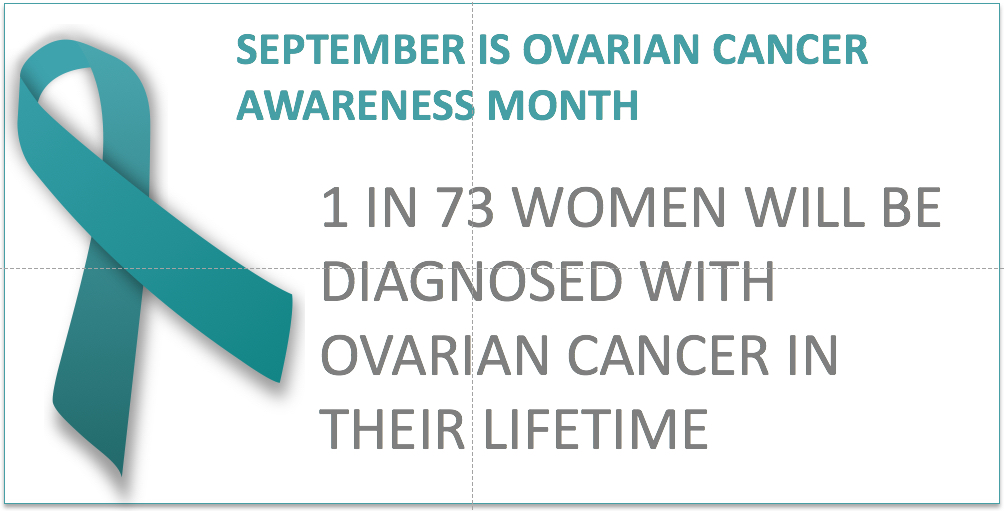
Sponsored by: #beBRCAware
Do you have ovarian cancer, or do you know someone who does? The American Cancer Society estimates that a woman’s risk of developing ovarian cancer is 1 in 73. So if you don’t know someone with ovarian cancer yet, odds are high that one day you will.
Ovarian cancer is cancer that starts in a woman’s ovaries. Women have two ovaries located in the abdomen on each side of the uterus. The ovaries produce eggs and the sex hormones estrogen and progesterone.
Ovarian cancer develops most often in women between the ages of 55 and 64, but it can develop at almost any age. The American Cancer Society lists ovarian cancer as the most deadly of all gynecological cancers.
Because there is no test for early detection of ovarian cancer, many cases are not discovered until the cancer has progressed to more advanced stages. Awareness of the signs and symptoms of ovarian cancer is a woman’s first defense against the disease.
The American Cancer Society lists these as the most common warning signs of ovarian cancer:
- Bloating
- Pain in the abdomen or pelvis
- Trouble eating or feeling full quickly
- Urinary urgency (feeling like you always have to go) or frequency (having to go often)
Other possible symptoms include:
- Abnormal vaginal bleeding
- Pain during sex
- Nausea or upset stomach
- Back pain
- Fatigue
- Constipation
- Losing weight with swelling in the abdomen
Between 10 and 15 percent of women who develop ovarian cancer have a known hereditary link to the disease, Ovarian Cancer National Alliance said. The greatest known risk factor for ovarian cancer is an inherited genetic mutation in one of two genes known as BRCA1 and BRCA2, commonly referred to as the "breast cancer" genes.
Women who have a close (first-degree) relative with ovarian cancer are also at higher risk of ovarian cancer even if there is no known genetic mutation. Women with a family history of breast cancer, colon cancer or uterine cancer may also be at higher risk.
Genetic testing gives women the option to find out whether they have mutations in the specific genes that put them at higher risk for ovarian cancer. This knowledge can give doctors an edge in monitoring for symptoms of ovarian cancer to try to provide earlier detection if the cancer should develop.
Statistics show that approximately 1.4 percent of women in general will develop ovarian cancer. By comparison, 39 percent of women with a harmful BRCA1 mutation and 11 to 17 percent of women with a BRCA2 mutation will develop ovarian cancer before age 70, according to the National Cancer Institute.
A genetic counselor can evaluate an individual’s risks and help explain the potential benefits of genetic testing so women can make an informed decision about whether to undergo testing or not. In general, health care professionals only recommend genetic testing for women who have a family history suggesting the harmful BRCA1 or BRCA2 gene. However, clinical practice guidelines recommend that all women with ovarian cancer be tested for a BRCA mutation, as the results may impact future treatment decisions.
Women who have ovarian or breast cancer can also provide valuable information to their family members by being genetically tested. If a woman with ovarian or breast cancer tests positive for the genetic mutation, her family will be armed with valuable information to talk to a genetic counselor who can help them decide whether they should consider genetic testing for themselves.
If you have ovarian cancer or if you have questions about your risks, talk to your health care provider about the possible benefits of genetic testing for you and for your family.
September is Ovarian Cancer Awareness Month. Post an inspirational message and follow #beBRCAware on Twitter, Facebook, Pinterest and Instagram to learn more about BRCA mutations and their importance to women with ovarian cancer.
Sources:
Mayo Clinic. Ovarian cancer. Web. August 27, 2014. http://www.mayoclinic.org/diseases-conditions/ovarian-cancer/basics/definition/con-20028096
American Cancer Society. Signs and symptoms of ovarian cancer. Web. August 27, 2014. http://www.cancer.org/cancer/ovariancancer/detailedguide/ovarian-cancer-signs-and-symptoms
Ovarian Cancer National Alliance. Risk Factors: Genetics. Web. August 27, 2014. http://www.ovariancancer.org/about/risk-factors/
National Cancer Institute. BRCA1 and BRCA2: Cancer Risk and Genetic Testing. Web. August 27, 2014. http://www.cancer.gov/cancertopics/factsheet/Risk/BRCA
Society of Gynecologic Oncology. SGO Clinical Practice Statement: Genetic Testing for Ovarian Cancer. Web. September 11, 2014. https://www.sgo.org/clinical-practice/guidelines/genetic-testing-for- ovarian-cancer/
Reviewed August 29, 2014 by Michele Blacksberg RN




Add a Comment1 Comments
We really had no cancer in the family. My 74 year old mother was very active, and generally in good health, always keeping up with her medical appts and screenings. In late January she complained of shortness of breath, like something was sitting on her chest. Very long story short, it turned out to be stage 4 ovarian cancer -- the fluid from her belly area was causing the breathing problems. Mom was gone March 6. This is a very scary disease. Listen to your body. Push your doctors.
September 16, 2014 - 8:24amThis Comment